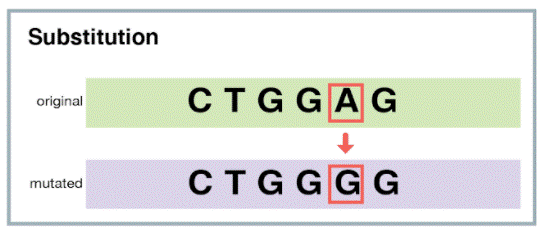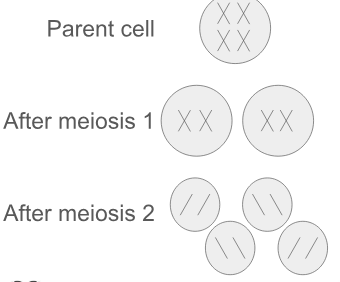4.3 genetic diversity can arise asa result of mutation or during meiosis
1/12
There's no tags or description
Looks like no tags are added yet.
Name | Mastery | Learn | Test | Matching | Spaced |
|---|
No study sessions yet.
13 Terms
what is a mutation?
an alteration to the DNA base sequence. often arise spontaneously during DNA replication
why might a mutation not lead to change in the amino acid sequence?
genetic code is degenerate, so mutation may end up coding for the same amino acid as the original triplet
mutation may occur in intron
what is a substitution mutation
nucleotide in DNA sequence is replaced by another. this is more likely to be a silent mutation, meaning no change occurs in the amino acid sequence

what is a deletion mutation
nucleotide in DNA sequence is lost. leads to frame shift, so entire amino acid sequence is different
what is a mutagenic agent, give examples
factors that increase the rate of gene mutation. x-rays, uv light, gamma rays, certain chemicals e.g. in alcohol or tobacco
what is a polyploidy chromosome mutation
where an individual has three or more sets of chromosomes instead of two
what is a chromosome non-disjunction?
when chromosomes fail to separate correctly in meiosis, resulting in gametes with one more or less chromosome than normal
what is meiosis
form of cell division that produces four genetically different haploid cells (cells with half the number of chromosomes found in the parent cell) known as gametes
how does meiosis differ from mitosis?
meiosis produces four genetically different cells with half the number of chromosomes as the parent cells
mitosis produces two genetically identical cells with the same number of chromosomes as the parent cells
what happens during meiosis 1
homologous chromosomes pair to form bivalents
crossing over (exchange of sections of genetic material) occurs as chiasmata
cell divides into two. homologous chromosomes separate randomly. each cell contains either maternal or paternal copy
what happens during meiosis 2
independent segregation of sister chromatids
each cell divides again, producing 4 haploid cells
diagram to show cell contents after each stage of meiosis

in which two ways does meiosis produce genetic variation?
crossing over during meiosis 1
independent assortment of homologous chromosomes and sister chromatids
result in new combinations of alleles